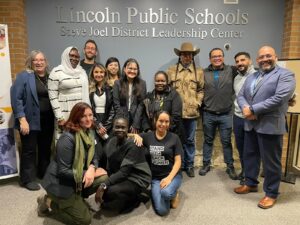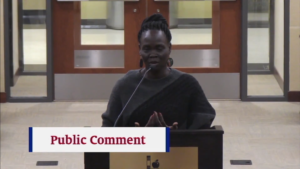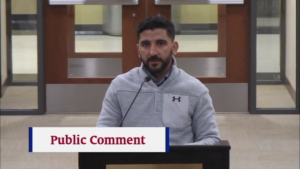As we all are actively creating opportunities for immigrant community members to engage with local governments, we wanted to share this recent example with you.
In a powerful display of unity and advocacy, a diverse group of community members – hailing from various backgrounds including immigrants, refugees, and indigenous people – came together at a recent Lincoln school board meeting to champion the cause of inclusive education.
The meeting served as a platform for these passionate individuals to share their stories, voice concerns, and urge the school board to adopt policies that celebrate diversity and foster a more inclusive learning environment, where every student and their families can belong.
Kicking off the public comment portion of the Lincoln Board of Education meeting on November 28, 2023, Lisa Guill, Lincoln’s Welcoming Communities Coordinator, presented recommendations from the Lincoln / Lancaster County Welcoming & Belonging Strategic Plan. The room buzzed with a palpable energy as individuals from different walks of life united in their commitment to creating a more inclusive and equitable school system. Suggestions ranged from incorporating diverse perspectives into the curriculum to providing training for educators on culturally responsive teaching methods.
Nyabuoy Chan, who works with the Asian Community and Cultural Center as the Family Resource Program Coordinator, spoke as someone who came to the community as a refugee, a parent of 5 children who attend LPS, and as a community advocate, urging, “I would love to see all of our lovely teachers to be educated about cultural competency.” Chan shared examples of unfortunate incidents that occurred within LPS that she says could be prevented if faculty receive training on cultural competency.
The school board listened attentively as community leaders presented evidence-based proposals for implementing inclusive practices. Community leaders made a compelling case for the school board to lead the way in creating a safe, welcoming, and inclusive space for all students.
Steve Laravie Jr., who is the Executive Director of the Lincoln Indian Center, raised a concern that the community has about “the aspects of American Indian history and culture being interwoven into the curriculum.” The request from the community that he relayed is to ensure that there is an indigenous voice in the development of the curriculum, “as we do not want to lose another five years of misinformation concerning our history.” Leravie expressed that he felt an obligation to be present at the meeting as a representative of the original peoples of this land.
Haroon Al Hayder, speaking as an immigrant and community advocate, acknowledged the transformative power of education in fostering a profound sense of belonging in Lincoln. His testimony focused on what he defined as one key pillar in achieving the vision for a more accessible, inclusive, and equitable education system: diversity in school faculty and administrators. He presented a well-researched fact that diverse educators offer a wealth of experiences and perspectives to the classroom, which “strengthens cultural understanding among students and creates an environment where everyone’s story is acknowledged and respected.” Additionally, diverse staff can serve as role models for the youth, as well as “break down stereotypes, open doors, and encourage students of New Americans to pursue their dreams regardless of their backgrounds.”
Community members emphasized the importance of continuous professional development for teachers and staff, incorporating training on implicit bias, institutional racism, and cultural competency – coupled with policy changes to attract and retain diverse administrators and educators – all while utilizing targeted data to address educational disparities.
As the meeting concluded, there was a shared sense of optimism and determination among attendees. The call for inclusivity had been sounded, and community members left the school board meeting with a renewed sense of purpose, knowing that they had planted the seeds for a more inclusive and equitable future in education. The community members that I spoke to reflected that this is just the beginning for them, and they are eager to continue advocating for inclusion locally. You can watch the video of the meeting here (public comment begins at the 23:00 minute mark).
Local school boards are a great place for community members to become involved in local decision making, and it’s vital for local school board members to hear from many voices in the community. School boards approve curriculum, which guides what students learn and talk about in the classroom, and they develop a budget for teacher pay as well as building or playground spaces that may be used for the whole community.
We encourage you to think about getting involved in your local school board or other decision making space – if you’d like ideas of where to start, please reach out!




